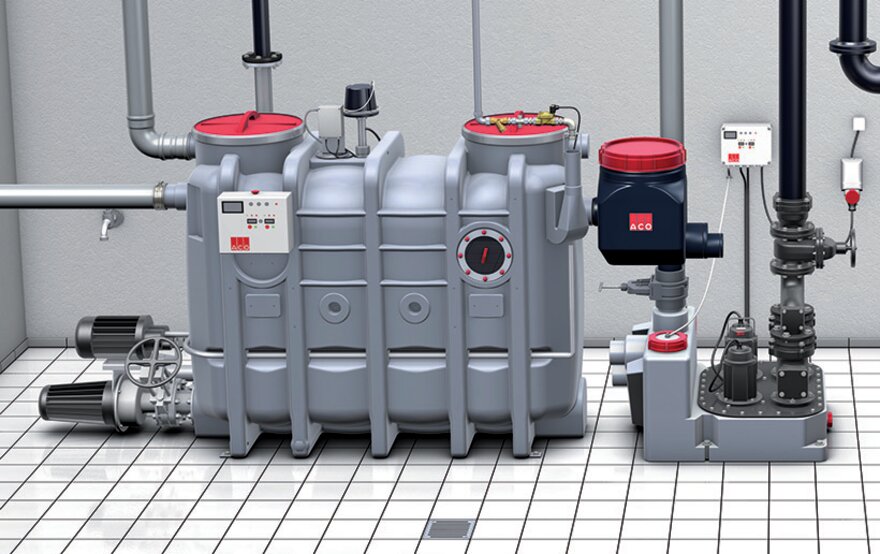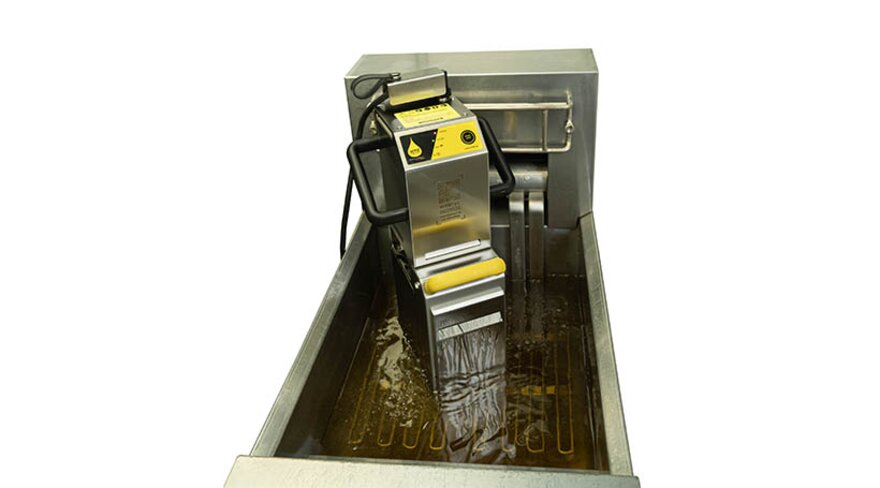Drain brain: ways to clear the FOG
With reputational damage a growing risk, deploying an effective fat, oil and grease management solution is a no-brainer. Ian Boughton reports on the fatberg-foilers
Nine out of 10 hospitality businesses are, it is claimed, discharging dangerous muck into the nation's sewers. And the reason this matters to everyone from hotels to corner cafés is that the water companies have decided to get tough on the businesses that are clogging up our sewers.
They have already begun. The first case has been brought by Southern Water, which had a court make a Sussex restaurant pay £2,285 for blocking local sewers with fat, oil and grease.
The combination of residual cooking matter, known in the trade as FOG (fat, oil and grease), covers all the oils and greases which can be found in a commercial kitchen.
It was Thames Water that made the astonishing accusation, a couple of years back, that "the vast majority" of London's restaurants and takeaways were responsible for the poor FOG disposal practices that had led to such events as the infamous 2017 discovery of a 130-tonne fatberg that clogged sewers in Whitechapel. Thames Water said not a single restaurant in the area had been found to have a working grease trap or similar anti-FOG precaution.
The utility company's claim may have some merit. The Foodservice Equipment Association (FEA) says in its own guide to FOG management that only 12% of foodservice establishments are using preventative equipment, and fewer than one in 650 follow accepted best practice for dealing with such waste.
With some fairness, the Thames Water sewer network manager pointed out at the time that many restaurant staff do not knowingly pour frying fat down a drain – it is the odd fat and scraps washed off dirty plates, pots and pans which is the problem. But in the Southern Water case, the restaurant owner was aware he was indeed handling his waste carelessly; he even admitted that he had been warned to fit a fat trap over 10 years before and had simply not bothered to do so.
Not obvious
It is not, though, the obvious cooking oils that cause all the problems – a restaurant's dishwasher may be to blame for FOG discharge.
This is a known problem. The FEA's technical director Andy Threlfall addressed the Water Research Council's recent ‘Dishwasher Debate' on whether dishwashers should be connected to grease management systems.
"I said that current legislation under the Water Industry Act specifically mentions drainage in commercial food premises," he explains. "Dishwashers are designed to clean and sanitise items using a mixture of chemicals and water – their waste water is likely to contain fats, oils and grease.
"We highlighted that the majority of foodservice establishments do not have any systems in place to effectively manage their effluent, either from the dishwasher or from the whole kitchen. This is something which needs addressing."
The FEA's new Fat, Oil and Grease Management Guide (available at bit.ly/FEA-FOG) highlights a surprising number of everyday kitchen items that should be given a risk assessment. It's not just the obvious deep-fat fryers, but also combi steam ovens, which can "generate significant levels of FOG", rotisserie ovens ("high risk potential"), bratt pans and tilt kettles, and anything used in the preparation of dairy items, such as ice-cream.
The guide makes the point that while kitchen waste may seem harmless in liquid form, animal fats and vegetable oils set and harden when that liquid cools. So a hot liquid that kitchen staff pour down the drain may travel a fair way through the sewer network before solidifying, which is how problems can emerge anywhere in the drainage system.
FOG fines
Under the law, water companies can reclaim the costs of removing blockages from the offending foodservice operator. So have kitchens in general improved their FOG disposal practices since the monster Whitechapel fatberg?
"Yes, more foodservice establishments are using grease management," says Peter Graham, partner at Biological Preparations, which owns the BioHygiene brand. "The reason is that water companies have prioritised this sector as a revenue source either by fines or recharge, and have now employed dedicated sewer-abuse divisions.
"One of the main things they have found is that in addition to the fat issue, the use of ‘unflushables' [wet wipes] has been estimated to cause 85% of sewer blockages."
Biological Preparations says caterers have various methods of grease management open to them. Graham explains: "Passive grease traps and grease removal units involve the physical removal of organic matter, and there is biodosing, which is the physical degradation of the fats and grease in the drain by bacterial strains that break down fat, oils and grease and organic matter. Our GreaseBeta fluid has been proven to degrade 90% of FOG, making it impossible to reform downstream."
GreaseBeta works in a pump that is installed by Biological Preparations. The pump releases the fluid into the drains every few hours, with the fluid replenished every few months.
However, the FEA warns that local regulations have to be considered when choosing a grease management system – some local authorities do not approve certain methods while others may welcome them.
FOG fixes
Erik Mul, technical product manager for drainage specialist ACO, says: "Some water companies are now even refusing to connect establishments that do not have proper FOG-management systems in place."
Two years ago, an ACO survey of 500 kitchen operators found that around half had experienced blocked pipes due to grease, and over half had suffered from general build-ups of grease in their kitchens. A quarter had experienced odour problems from fat and grease, and 12% had had to close temporarily due to fatbergs in the local sewers.
"These blockages are accumulations of waste products held together in a rock-like formation by FOG, which should have been dealt with before it entered the sewer," explains Mul. "Due to inappropriate FOG management in commercial kitchens, sewers can get backed up and cause flooding. "Simple under-sink grease traps are often the most cost-effective solution, though they have relatively limited capacity and are best for commercial kitchens catering for small numbers of meals per day.
"The secret is not only to select the right grease management system for the kitchen but also to understand the maintenance. A grease trap requires daily maintenance, emptying the food basket and scooping the grease from the top, and a grease recovery unit needs daily maintenance of emptying the food basket and grease container."
Fat tanks
Several equipment suppliers have created collection facilities within their products, to stop FOG getting to the drain.
At Rational, technical sales director Graham Kille offers an optional accessory to the company's iCombi Pro oven. This is an integrated fat drain that prevents the build-up of grease deposits; dripping fat is collected in the cooking cabinet and drained into special tanks. It is, he says, a safe and environmentally friendly process that minimises the expensive maintenance of grease extraction systems.
The idea of pumping out excess cooking waste is also incorporated in products from MKN. Its FlexiCombi oven has a grease collection option that, according to sales and marketing chief Wayne Bennett, allows operators to achieve "100% separation of recyclable cooking liquids, by pumping excess oil, fats and liquids from the oven into a separate container for collection. Any remaining waste water is near completely clean."
Essentially, the oils and grease fall into a lower part of the oven from where they are pumped out into a container. The method is the subject of a video by the stockist Jestic which shows that cooking 30 chickens for 50 minutes creates four litres of collectable grease.
Filtration
At Valentine Fryers and its sister company Cuisinequip, sales director Steve Elliott says its Vito oil filtration units slash the amount of waste a foodservice operator has to handle.
He says: "In the past year, the price of cooking oil has risen by as much as 200%, and that's why many businesses are turning to technology that can significantly extend the life of cooking oil, both to achieve savings and help reduce waste. With Vito portable oil filtration, an operator can reduce oil usage and the associated waste by as much as 50%."
The Vito unit is placed inside a fry tank, where it pumps the used oil through its filters, and returns cleaned oil to the fryer for reuse. The filters hold the waste from the filtered oil, and they are put into conventional waste rather than into the drains.
A typical user, says Valentine, is noodle specialist Tonkotsu, which has 16 sites. Founder Ken Yamada says he has achieved considerable savings as a result.
He says: "In Notting Hill, our busiest site, we would change our oil every day, having hand-sieved it between services. When we used Vito portable oil filtration on a three-week trial, our oil prices had risen by 140%. We now change our oil every four days, which is a 400% extension in oil life."
Suppliers
BioHygienebiologicalpreparations.com
FEAfea.org.uk
Rationalwww.rational-online.com
Valentinewww.valentinefryers.com
Continue reading
You need to create an account to read this article. It's free and only requires a few basic details.
Already subscribed? Log In












